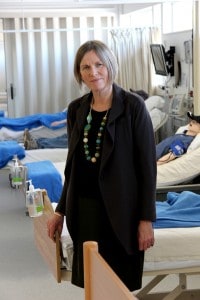 Dr Ruth Crawford recently completed her PhD through the University of Technology Sydney (UTS), which involved 280 hours of observation in the children’s ward of a New Zealand regional hospital. Her research examined communication involving emotions between nurses and parents of a child in hospital, with a particular focus on the cultural context of the child’s care.
Dr Ruth Crawford recently completed her PhD through the University of Technology Sydney (UTS), which involved 280 hours of observation in the children’s ward of a New Zealand regional hospital. Her research examined communication involving emotions between nurses and parents of a child in hospital, with a particular focus on the cultural context of the child’s care.
In the field of inpatient child health nursing, the nurse relates to both the child who is a patient and the child’s parents or caregivers. The relationship the nurse develops with parents is vital in the management of the child’s care because most parents continue to parent their child and work alongside the nurse. There is also an expectation that the parent or primary caregiver will remain involved in a child’s hospital care and work collaboratively with nurses.
Using focused ethnography as her research method, Ruth shadowed nurses as they went about their daily practice, informally talking with them and with the parents of their paediatric patients. All the while she amassed copious field notes which she followed with 20 formal interviews with both nurses and parents. To help her manage the volume and complexity of these data, all were uploaded into a qualitative data management software program which enabled their classification and order.
Ruth is now in the process of writing papers from her thesis. She is focussing on the ways that hospital ward and nursing culture influence and shape nurses’ behaviour with regard to emotional communication. Parents of children in hospital want to communicate emotionally with nurses but generally nurses choose not to acknowledge or respond to parents’ emotional cues. Both parents and nurses experienced difficulty with emotional communication, leaving parents feeling vulnerable and isolated and nurses inadequate and stressed. Nurses tend to protect themselves against parents’ emotional needs and the potential impact of emotional connections. The current system requires nurses to focus on the physical aspects of caring for the child.
Ruth’s findings highlight the difficulties faced by nurses practising in hospitals as they bridge the unease between organisational demands, the needs of people they encounter daily and their own personal vulnerabilities. Her conclusions include the recommendation that appropriate nursing models need to be further enmeshed in practice, such as the Family Partnership model which focuses on interaction with families and increasing skills of staff to work with them.
Ruth Crawford PhD
Principal Lecturer, School of Nursing
rcrawford@eit.ac.nz
